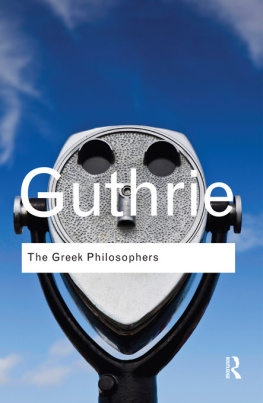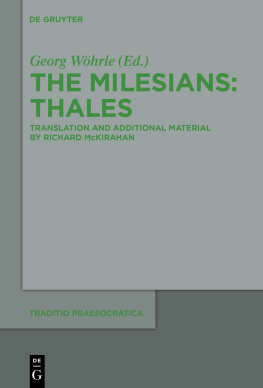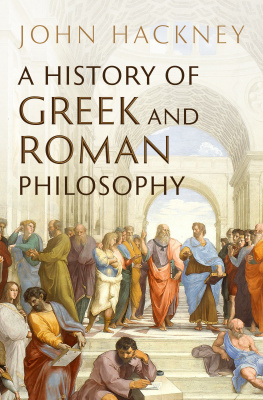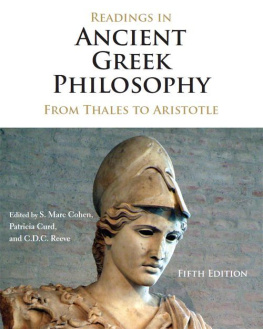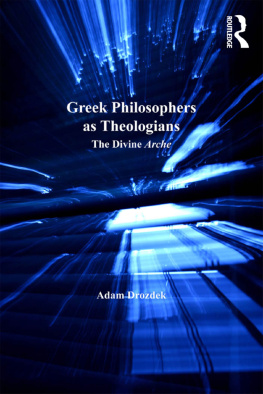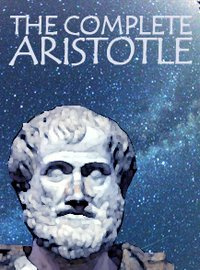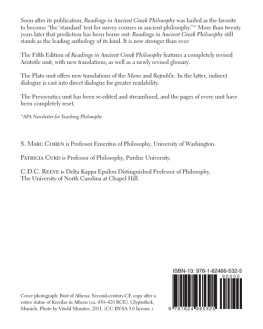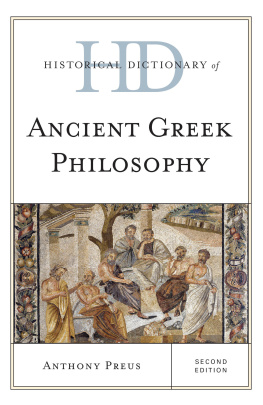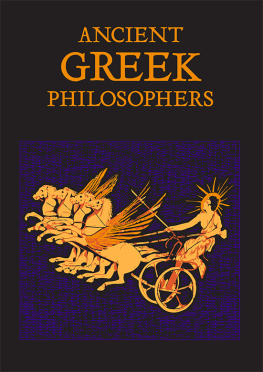Guthrie W. K. C. - The Greek philosophers: from Thales to Aristotle
Here you can read online Guthrie W. K. C. - The Greek philosophers: from Thales to Aristotle full text of the book (entire story) in english for free. Download pdf and epub, get meaning, cover and reviews about this ebook. City: London, year: 2013, publisher: Taylor and Francis; Routledge, genre: Science. Description of the work, (preface) as well as reviews are available. Best literature library LitArk.com created for fans of good reading and offers a wide selection of genres:
Romance novel
Science fiction
Adventure
Detective
Science
History
Home and family
Prose
Art
Politics
Computer
Non-fiction
Religion
Business
Children
Humor
Choose a favorite category and find really read worthwhile books. Enjoy immersion in the world of imagination, feel the emotions of the characters or learn something new for yourself, make an fascinating discovery.
- Book:The Greek philosophers: from Thales to Aristotle
- Author:
- Publisher:Taylor and Francis; Routledge
- Genre:
- Year:2013
- City:London
- Rating:4 / 5
- Favourites:Add to favourites
- Your mark:
- 80
- 1
- 2
- 3
- 4
- 5
The Greek philosophers: from Thales to Aristotle: summary, description and annotation
We offer to read an annotation, description, summary or preface (depends on what the author of the book "The Greek philosophers: from Thales to Aristotle" wrote himself). If you haven't found the necessary information about the book — write in the comments, we will try to find it.
The Greek philosophers: from Thales to Aristotle — read online for free the complete book (whole text) full work
Below is the text of the book, divided by pages. System saving the place of the last page read, allows you to conveniently read the book "The Greek philosophers: from Thales to Aristotle" online for free, without having to search again every time where you left off. Put a bookmark, and you can go to the page where you finished reading at any time.
Font size:
Interval:
Bookmark:

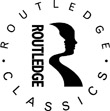
Routledge Classics contains the very best of Routledge publishing over the past century or so, books that have, by popular consent, become established as classics in their field. Drawing on a fantastic heritage of innovative writing published by Routledge and its associated imprints, this series makes available in attractive, affordable form some of the most important works of modern times.
For a complete list of titles visit
www.routledge.com/classics
First published in 1950 by Methuen & Co.
Reprinted 1989, 1991, 1993 and 1997 by Routledge
First published in the Routledge Classics 2013
2 Park Square, Milton Park, Abingdon, Oxon OX14 4RN
Simultaneously published in the USA and Canada
by Routledge
711 Third Avenue, New York, NY 10017
Routledge is an imprint of the Taylor & Francis Group, an informa business
W. K. C. Guthrie 2013
Foreword 2013 James Warren
All rights reserved. No part of this book may be reprinted or reproduced or utilised in any form or by any electronic, mechanical, or other means, now known or hereafter invented, including photocopying and recording, or in any information storage or retrieval system, without permission in writing from the publishers.
Trademark notice : Product or corporate names may be
trademarks or registered trademarks, and are used only for identification and explanation without intent to infringe.
British Library Cataloguing in Publication Data
A catalogue record for this book is available from the British Library
Library of Congress Cataloging-in-Publication Data
Guthrie, W. K. C. (William Keith Chambers), 1906-1981.
The Greek philosophers from Thales to Aristotle / W.K.C. Guthrie ; with a new foreword
by James Warren.
p. cm. -- (Routledge classics)
Includes index.
1. Philosophy, Ancient. 2. Philosophers, Ancient. I. Title.
B171.G8 2013
180--dc23
2012016304
ISBN: 978-0-415-52228-1 (pbk)
ISBN: 978-0-203-10568-9 (ebk)
Typeset in Joanna
by RefineCatch Limited, Bungay, Suffolk
EDITION BY JAMES WARREN
James Warren
The Greek Philosophers was published in 1950, two years before its author, W. K. C. Guthrie, was elected the third Laurence Professor of Ancient Philosophy in the University of Cambridge. It predates his monumental (and sadly unfinished) six-volume A History of Greek Philosophy by more than a decade (those volumes were published between 1962 and 1981) but is always likely to be the more widely read of the two. Few such books bear reading more than sixty years after their publication, particularly those that deal with so wide a topic and manage to cover it with style and in not many more than 150 pages. Nevertheless, despite the great flourishing of scholarship and the appearance of many similar volumes on ancient philosophy since it was written, the pace and tone of this book guarantee its continued interest. As its author points out at the outset, the intended audience are undergraduates reading any subject other than classics. And Guthrie writes throughout with care and attention to such an audience, explaining to non-specialists what there is to be found in these ancient authors and thinkers. The text skips along at a pace and never lets the complexity of the ideas being discussed obstruct the principal aim of informing interested readers of what the Greek philosophers were up to, in a manner which Guthrie thinks is free from the potentially distorting effects of the intervening centuries of reception and discussion of their ideas. The aim is to instruct and inform and the primary method of instruction is exposition via a story of development and, for the most part, progress over the period between Thales and Aristotle.
Although he has in mind an audience unfamiliar with the texts in their original language, Guthrie explains clearly and succinctly where necessary the importance of understanding the precise nuances and connotations of the terms and concepts under scrutiny. Indeed, he is insistent throughout on differences between his world and that of the Greek philosophers and on the importance of understanding what he calls the cultural soil of their ideas. His Greek philosophers, particularly the early Greek philosophers, are a peculiar and unusual bunch. He sees them as great pioneers in questions of science and philosophy but pioneers whose faltering steps should be understood in their proper context.
We might, with some caveats, describe Guthries approach as a combination of two principal methods of philosophical historiography. On the one hand, he takes from Aristotle the outlines of the history of Greek philosophy, building from Ionian natural philosophy through Socratic and sophistic approaches to humanity and morals to the great systems of Plato and then Aristotle himself. (Guthries confidence in the Aristotelian account was not shaken by the attack launched on Aristotles value as a witness to his predecessors by Harold Cherniss in two volumes published in 1935 and 1944. Guthries elegant retort in 1957 is a useful statement of his overall attitude to the question.) The general story is one of gradual progress and improvement, with Aristotle finally harnessing the best of natural philosophy with the importance of the metaphysics of form and teleology that was first seen by Pythagoras and then refined by Plato himself, and combining this with a developed form of Socrates interest in ethics and Platos emphasis on the importance of political harmony.
The other significant mode of analysis comes more from the anthropological approaches to the ancient world that had made an impact at the time Guthrie was writing. (E. R. Dodds influential The Greeks and the Irrational was first published one year later in 1951.) A large proportion of the book is devoted to the philosophers before the great trio of Socrates, Plato, and Aristotle, and much of that section is interested in showing how the cosmological speculations of the early philosophers can be understood in relation to the pre-philosophical past. While there is evident merit in insisting that the early stages of philosophical inquiry took place in a world that was culturally and intellectually very unlike our own, this approach also allows Guthrie a ready-made explanation for what he found to be the otherwise peculiar and disappointing aspects of the philosophers he presents. For example, Anaximander wins plaudits for his speculative cosmology and scientific advances Guthrie is quite happy to call Anaximander a scientist but is nevertheless still unfortunately bound to a primitive notion of the universe as being a living whole, a notion to which anthropologists have found parallels among savage people all over the world (29). Sometimes, his attitude to these Greek philosophers is a curious mixture of admiration and condescension. They are regularly applauded for making early steps away from a nave or primitive outlook but then marked down for being unable entirely to shake off the shackles of their intellectual inheritance. Elsewhere, Guthrie is too quick to find fault and his judgement is surely questionable. For example, he diagnoses what he thinks are the tiresome arguments of the Eleatic philosopher Parmenides as stemming from an unfortunate logical naivety to which even the least philosophical of us would not be prone: One idea which the Greeks at this stage found it difficult to absorb was that a word might have more than one meaning. Their difficulty no doubt had something to do with the proximity of the primitive magical stage at which a word and its object formed a single unity (44). Current understandings of early Greek poetry and even philosophers such as Heraclitus show quite clearly that Guthries diagnosis is at best a misunderstanding. Modern readers would perhaps do well to read such comments with a very critical eye. In short, we should certainly recognise the importance of Guthries clear and confident insistence on the importance of cultural context, even if we might not accept his tendency to attribute anything he finds mistaken or foolish to a legacy from primitive thought, nor the manner in which he is inclined to describe those traditional societies.
Font size:
Interval:
Bookmark:
Similar books «The Greek philosophers: from Thales to Aristotle»
Look at similar books to The Greek philosophers: from Thales to Aristotle. We have selected literature similar in name and meaning in the hope of providing readers with more options to find new, interesting, not yet read works.
Discussion, reviews of the book The Greek philosophers: from Thales to Aristotle and just readers' own opinions. Leave your comments, write what you think about the work, its meaning or the main characters. Specify what exactly you liked and what you didn't like, and why you think so.

